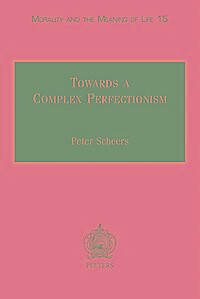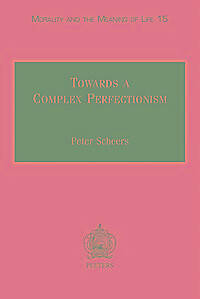
Je cadeautjes zeker op tijd in huis hebben voor de feestdagen? Kom langs in onze winkels en vind het perfecte geschenk!
- Afhalen na 1 uur in een winkel met voorraad
- Gratis thuislevering in België vanaf € 30
- Ruim aanbod met 7 miljoen producten
Je cadeautjes zeker op tijd in huis hebben voor de feestdagen? Kom langs in onze winkels en vind het perfecte geschenk!
- Afhalen na 1 uur in een winkel met voorraad
- Gratis thuislevering in België vanaf € 30
- Ruim aanbod met 7 miljoen producten
Zoeken
Omschrijving
This book examines the content of a complex perfective anthropology beyond absolute, abstract, negative and minimalist readings. A rich sense of perfection is here to stay because of the ineradicable existential role of gradational estimation in terms of better and worse. The first section focuses on the connection between hermeneutics and perfectionism. The author claims that a hermeneutical conception of interpretation unavoidably implies a perfective scheme of better and worse, and that a contemporary perfectionism should be based exactly on a hermeneutical theory of interpretation. The second section introduces a differentiated language of perfection as positive. The author argues that we need a plurivocal list of kinds and levels of perfection as to be able to reach a higher sense of estimation. Human appraisal itself, so it turns out, can be undertaken in better and worse ways. The third section consolidates and extends the idea of a perfective anthropology. Here we are brought to a consideration of ourselves as organisms of a certain kind, of the personalised aspects of the human quest for perfection, of perfective experience in the context of concrete practices, and of the possibility of future perfection. The book ends with a chapter on environmental perfectionism, arguing that a benign human interpretation of non-human nature should include a careful application of the perfective concept of a life story to the realm of plants and animals. This application is meant to underscore the moral insight that we are not the only heroes of perfective being.
Specificaties
Betrokkenen
- Auteur(s):
- Uitgeverij:
Inhoud
- Aantal bladzijden:
- 210
- Taal:
- Engels
- Reeks:
- Reeksnummer:
- nr. 15
Eigenschappen
- Productcode (EAN):
- 9789042916555
- Verschijningsdatum:
- 31/12/2005
- Uitvoering:
- Paperback
- Formaat:
- Trade paperback (VS)
- Afmetingen:
- 163 mm x 241 mm
- Gewicht:
- 353 g

Alleen bij Standaard Boekhandel
+ 190 punten op je klantenkaart van Standaard Boekhandel
Beoordelingen
We publiceren alleen reviews die voldoen aan de voorwaarden voor reviews. Bekijk onze voorwaarden voor reviews.









